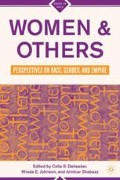Abstract
Gloria Naylor, arguably one of the most talented authors on the contemporary literary scene, has never shied away from addressing taboo subjects in her fiction. Her treatment of same-sex relations offers an example of her willingness not only to confront delicate social and interpersonal issues, but to also handle them with deftness and sensitivity. A reading of her expanding canon reveals an ongoing authorial concern with the triumph and tragedy, joy and, more often, sorrow of those who dare to defy heterosexual norms. Naylor is, of course, not the first or only African American woman writer to explore gay/lesbian relations. Alice Walker, Gayl Jones, Ntozake Shange, and Audre Lorde, among others, have navigated this territory as well. But the forbidden love that imperils many of Naylor’s characters is a continuing emphasis in the author’s works, even as it serves as a locus for the interrogation of space.
Access this chapter
Tax calculation will be finalised at checkout
Purchases are for personal use only
Preview
Unable to display preview. Download preview PDF.
Notes
Gloria Naylor, “Gloria Naylor,” Conversations with Gloria Naylor, ed. Maxine Lavon Montgomery (Jackson: University Press of Mississippi, 2004), 71–72.
Homi Bhabha, The Location of Culture (New York: Routledge, 1994).
Patricia Hill Collins, Black Feminist Thought: Knowledge, Consciousness, and the Politics of Empowerment (New York: Routledge, 1991), 95.
Gloria Naylor, The Women of Brewster Place (New York: Viking Press, 1982), 131.
Ibid., 129.
Gloria Anzaldua, Preface to Borderlands/La Frontera: The New Mestiza (San Francisco: Aunt Lute Books, 1987).
Marilyn Farwell, Heterosexual Plots and Lesbian Narratives (New York: New York University Press, 1996).
See Barbara Smith, “The Truth Never Hurts: Black Lesbians in Fiction in the 1980’s,” Wildwomen in the Whirlwind: Afro-American Culture and the Contemporary Literary Renaissance, ed. Joanne Braxton and Andree Nicola McLaughlin (New Brunswick: Rutgers University Press, 1990). Smith finds Naylor’s representation of gay/lesbian relations to be unrealistic and pessimistic. In my interview with Naylor, however, she responds to Smith’s criticisms by asserting that her gay/lesbian characters are no more tragic than her other (straight) characters. See Naylor, “A Conversation with Gloria Naylor,” interview by the author, tape recording, Brooklyn, New York (May 3, 2003).
Naylor, The Men of Brewster Place (New York: Hyperion, 1998), 166.
Ibid., 76.
Ibid., 78.
Henderson bases her theory in part on Mikhail Bakhtin’s discussion in The Dialogic Imagination: Four Essays, ed. Michael Holquist, trans. Caryl Emerson and Michael Holquist (Austin: University of Texas Press, 1981). See Mae Henderson, “Speaking in Tongues: Dialogism and the Black Woman Writer’s Literary Imagination,” in Changing Our Own Words: Essays on Criticism, Theory, and Writing by Black Women, ed. Cheryl Wall (New Brunswick: Rutgers University Press, 1989).
Naylor, Linden Hills (New York: Tricknor and Fields, 1985), 75.
Henry Louis Gates, Jr., sees a homoerotic attraction between Lester and Willie and between Lutheer and Willie. See Gates, “Significant Others,” Contemporary Literature 29 (1988): 606–23.
Naylor, Bailey’s Cafe (New York: Harcourt, Brace, and Jovanovich, 1992), 193.
Editor information
Editors and Affiliations
Copyright information
© 2007 Celia R. Daileader, Rhoda E. Johnson, and Amilcar Shabazz
About this chapter
Cite this chapter
Montgomery, M.L. (2007). Looking for Love in All the Wrong Places: Same-Sex Relations in the Fiction of Gloria Naylor. In: Daileader, C.R., Johnson, R.E., Shabazz, A. (eds) Women & Others. Signs of Race. Palgrave Macmillan, New York. https://doi.org/10.1057/9780230607323_4
Download citation
DOI: https://doi.org/10.1057/9780230607323_4
Publisher Name: Palgrave Macmillan, New York
Print ISBN: 978-0-312-29602-5
Online ISBN: 978-0-230-60732-3
eBook Packages: Palgrave Social & Cultural Studies CollectionSocial Sciences (R0)

